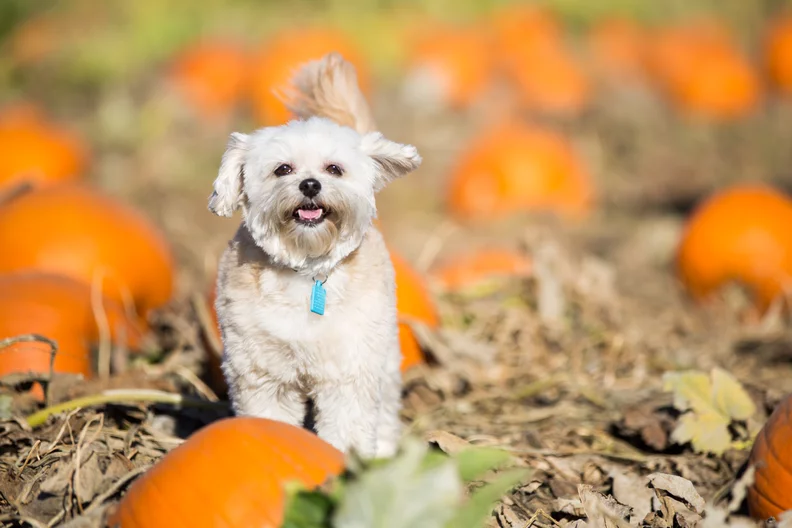Nutrition for Pets: Fall Edition

As we transition into the cooler months of autumn, the change in season often brings a shift in our diets. Pumpkin spice lattes and apple pies started appearing on our tables, but what about our furry friends? In this blog, we’ll dive into some nutritional tips for your pets this fall season.
Seasonal foods are not only fresher but often more nutrient-dense. They also provide variety in your pet’s diet, which can make mealtimes more exciting for them. However, knowing which seasonal foods are safe and beneficial for your pets is crucial.
For the doggos:
🎃Pumpkin
This vibrant orange vegetable is a powerhouse of nutrition for dogs. It’s rich in fiber, which aids in digestion and can help with diarrhea and constipation. Additionally, pumpkin is packed with essential vitamins like Vitamin A, E, and C, promoting eye health and boosting the immune system. Offer plain, cooked pumpkin and avoid sugary pumpkin pie filling.
🍎Apples
A crunchy treat that dogs love, apples are a great source of vitamins A and C. They also contain fiber, which can benefit a dog’s digestive system. Just remember to remove the seeds and core before feeding them to your pup.
🥔Sweet Potatoes
Another fiber-rich food, sweet potatoes are beneficial for a dog’s digestive health. They’re also a good source of vitamin B6, vitamin C, and manganese. Plus, their natural sweetness is often a hit with our four-legged friends.
🥕Carrots
These crunchy veggies are low in calories and high in fiber and vitamins. They can be a great chewy treat for your dog, promoting dental health. Rich in beta-carotene, they also support eye health.
🥒Green Beans
Packed with important vitamins and minerals like vitamins C and K, manganese, and fiber, green beans are a healthy addition to your dog’s diet. They’re also low in calories, making them a great treat for dogs on a weight management plan.
For the kitties:
🐟Salmon
A favorite among many cats, salmon is rich in omega-3 fatty acids, which are essential for a healthy coat, skin, and immune system. It’s also a great source of protein, helping to maintain lean muscle mass. Make sure it’s cooked and boneless.
🍗Chicken
A lean source of protein, chicken supports muscle growth and maintenance in cats. It’s also packed with essential amino acids and vitamins, ensuring your feline gets a balanced diet. It can be served cooked and shredded
🥒Peas
These little green gems are more than just a tasty treat. Peas are a good source of vitamins, minerals, and dietary fiber. They can aid in digestion and provide essential nutrients like vitamin K and manganese. They can be added to their regular cat food for extra nutrition.
🎃Pumpkin
Not just for dogs, pumpkin is beneficial for cats too! It’s rich in fiber, which can help with hairball control and promote a healthy digestive system. Plus, it’s a natural source of vitamins A and C, supporting overall health. digestive health but served it in moderation.
🍈Melon
Some cats enjoy melon as a treat. It’s hydrating and packed with vitamins
Foods to avoid:
- Chocolate: Contains theobromine and caffeine, which can be toxic to both dogs and cats.
- Grapes and Raisins: Can cause kidney failure in dogs. It’s unclear why they’re toxic, and the amount that might cause problems varies between individual animals.
- Onions and Garlic: Can cause gastrointestinal irritation and could lead to red blood cell damage, especially in cats.
- Alcohol: Can cause vomiting, diarrhea, decreased coordination, central nervous system depression, and even death.
- Caffeine: Found in coffee, tea, and many sodas, caffeine can be harmful and even lethal in high amounts.
- Bones: Can splinter and cause blockages or tears in the digestive system.
- Xylitol: A sugar substitute found in many sugar-free products, xylitol can lead to insulin release, which can cause hypoglycemia (low blood sugar).
- Raw Yeast Dough: Can expand in the stomach or intestines and produce alcohol, leading to alcohol poisoning.
- Macadamia Nuts: Toxic to dogs and can cause weakness, vomiting, tremors, and hyperthermia.
- Fatty Foods: High-fat foods can lead to pancreatitis in pets.
- Avocado: Contains persin, which can cause diarrhea, vomiting, and heart congestion.
- Dairy Products: Many dogs and cats are lactose intolerant, which means they can’t digest lactose found in milk and other dairy products.
- Cherries: The pits, stems, and leaves contain cyanide, which is toxic.
- Mushrooms: Some mushrooms can be toxic and cause a range of symptoms from gastrointestinal upset to severe organ damage.
- Tobacco: Contains nicotine, which can be lethal to pets.
Final Tips:
- Portion Control: Treats and supplemental foods should make up no more than 10% of your pet’s daily caloric intake.
- Consult Your Vet: Always consult your veterinarian before introducing new foods into your pet’s diet, especially if they have known food allergies or sensitivities.
- Quality Over Quantity: Always choose fresh, high-quality produce. Organic is preferable to minimize pesticide exposure.
We hope these tips help you provide a nutritious and enjoyable fall season for your pets. Stop by our store or visit our online shop for a variety of pet-friendly foods and treats that are perfect for autumn!
Happy Feeding!
